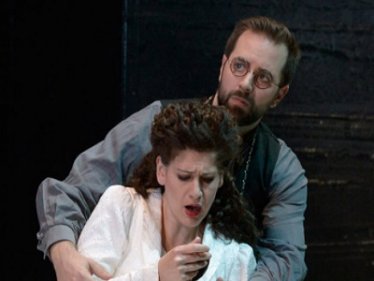Don Carlo - Schedule, Program & Tickets
Don Carlo
Opera in four acts
Libretto by Joseph Méry and Camille du Locle based on Friedrich Schiller's tragedy
First performance of the Italian version by Achille de Lauzières on January 10, 1884 in Milan
Premiere at the Deutsche Oper Berlin on October 23, 2011
In Italian with German and English surtitles
3 hours 30 minutes / one break
Introduction: 45 minutes before the start of the performance in the foyer on the right
We know that Giuseppe Verdi, as a critical mind, not only struggled with the times of his epoch, but also met his own work with a skepticism that was constantly ready to be revised.
He has not edited, shortened, rearranged and redrafted any other of his operas as often as the one that, thanks to its tight knit of political, religious and social constraints, comes closest to the inevitability of Greek drama and thus has become its darkest: DON CARLO.
Almost twenty years passed between the beginning of the composition in 1865 and the Milanese performance of the four-act version that is the most frequently performed today. Verdi not only struggled with the two languages and their so different expressive gestures, but also tried again and again to achieve the best result by shortening and rearranging. Schiller's drama is largely faithful to the opera in no fewer than seven versions.
The light of reason, of course, cannot be seen in anyone. Prisoners of their compulsions, prisoners in self-imposed reins, but above all prisoners of an ever deadly threatening spiritual power, which is not even able to cope with worldly domination - Verdi sums up the hopelessness of human entanglement in this network of terror in an elementary way: Freedom promises at best Death.
Musical director James Gaffigan
Staging, stage, lighting Marco Arturo Marelli
Costumes Dagmar Niefind
Jeremy Bines choirs
Philip II. Alex Esposito
Don Carlo Robert Watson
Rodrigo, Marquis of Posa Etienne Dupuis
Count of Lerma / Herald Gideon Poppe
The Grand Inquisitor Albert Pesendorfer
A monk Andrew Harris
Elisabeth by Valois Nicole Car
Princess Eboli Yulia Matochkina
Tebaldo N.N.
Voice from above Valeriia Savinskaia
1. Flanders Deputy Samueol Park
2. Flanders Deputy N. N.
3. Flanders Deputy Padraic Rowan
4. Flanders Deputy Tyler Zimmerman
5. Flanders Deputy Philipp Jekal
6. Flanders Deputy Byung Gil Kim
Choir of the Deutsche Oper Berlin
Orchestra of the Deutsche Oper Berlin
Subject to changes.
Libretto by Joseph Méry and Camille du Locle based on Friedrich Schiller's tragedy
First performance of the Italian version by Achille de Lauzières on January 10, 1884 in Milan
Premiere at the Deutsche Oper Berlin on October 23, 2011
In Italian with German and English surtitles
3 hours 30 minutes / one break
Introduction: 45 minutes before the start of the performance in the foyer on the right
We know that Giuseppe Verdi, as a critical mind, not only struggled with the times of his epoch, but also met his own work with a skepticism that was constantly ready to be revised.
He has not edited, shortened, rearranged and redrafted any other of his operas as often as the one that, thanks to its tight knit of political, religious and social constraints, comes closest to the inevitability of Greek drama and thus has become its darkest: DON CARLO.
Almost twenty years passed between the beginning of the composition in 1865 and the Milanese performance of the four-act version that is the most frequently performed today. Verdi not only struggled with the two languages and their so different expressive gestures, but also tried again and again to achieve the best result by shortening and rearranging. Schiller's drama is largely faithful to the opera in no fewer than seven versions.
The light of reason, of course, cannot be seen in anyone. Prisoners of their compulsions, prisoners in self-imposed reins, but above all prisoners of an ever deadly threatening spiritual power, which is not even able to cope with worldly domination - Verdi sums up the hopelessness of human entanglement in this network of terror in an elementary way: Freedom promises at best Death.
Musical director James Gaffigan
Staging, stage, lighting Marco Arturo Marelli
Costumes Dagmar Niefind
Jeremy Bines choirs
Philip II. Alex Esposito
Don Carlo Robert Watson
Rodrigo, Marquis of Posa Etienne Dupuis
Count of Lerma / Herald Gideon Poppe
The Grand Inquisitor Albert Pesendorfer
A monk Andrew Harris
Elisabeth by Valois Nicole Car
Princess Eboli Yulia Matochkina
Tebaldo N.N.
Voice from above Valeriia Savinskaia
1. Flanders Deputy Samueol Park
2. Flanders Deputy N. N.
3. Flanders Deputy Padraic Rowan
4. Flanders Deputy Tyler Zimmerman
5. Flanders Deputy Philipp Jekal
6. Flanders Deputy Byung Gil Kim
Choir of the Deutsche Oper Berlin
Orchestra of the Deutsche Oper Berlin
Subject to changes.
There are no products matching the selection.






